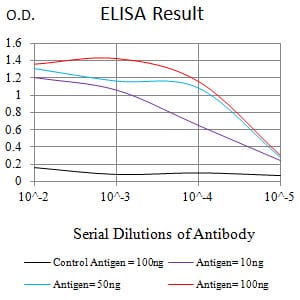


| WB | 咨询技术 | Human,Mouse,Rat |
| IF | 咨询技术 | Human,Mouse,Rat |
| IHC | 1/200 - 1/1000 | Human,Mouse,Rat |
| ICC | 技术咨询 | Human,Mouse,Rat |
| FCM | 1/200 - 1/400 | Human,Mouse,Rat |
| Elisa | 1/10000 | Human,Mouse,Rat |
| Aliases | IP; SDH; CWS2; PGL4; SDH1; SDH2; SDHIP |
| Entrez GeneID | 6390 |
| clone | 2E8B11 |
| WB Predicted band size | 31.6kDa |
| Host/Isotype | Mouse IgG1 |
| Antibody Type | Primary antibody |
| Storage | Store at 4°C short term. Aliquot and store at -20°C long term. Avoid freeze/thaw cycles. |
| Species Reactivity | Human |
| Immunogen | Purified recombinant fragment of human SDHB (AA: 29-280) expressed in E. Coli. |
| Formulation | Purified antibody in PBS with 0.05% sodium azide |
+ +
以下是3篇关于SDHB抗体的代表性文献及其摘要概括:
---
1. **文献名称**: *Immunohistochemistry for SDHB Triages Genetic Testing of SDHB, SDHC, and SDHD in Paraganglioma-Pheochromocytoma Syndromes*
**作者**: Gill AJ, et al.
**摘要**: 该研究提出通过SDHB抗体的免疫组化检测(阴性结果提示SDH复合体功能缺陷),可作为筛选SDHB/SDHC/SDHD基因突变相关副神经节瘤/嗜铬细胞瘤的有效方法,优化遗传检测流程。
2. **文献名称**: *An Immunohistochemical Procedure to Detect Patients With Paraganglioma and Pheochromocytoma With Germline SDHB, SDHC, or SDHD Gene Mutations: A Single-Center Experience*
**作者**: Thompson LD, et al.
**摘要**: 研究证实SDHB免疫组化阴性结果与SDHx基因(SDHB/SDHC/SDHD)胚系突变高度相关,建议将其作为此类肿瘤的常规筛查手段,辅助遗传咨询和临床管理。
3. **文献名称**: *SDHB/SDHA Immunohistochemistry in Pheochromocytomas and Paragangliomas: A Multicenter Interobserver Variation Analysis*
**作者**: Papathomas TG, et al.
**摘要**: 多中心研究显示,SDHB抗体免疫组化在不同实验室间具有高度可重复性,其阴性结果可可靠指示SDH缺陷型肿瘤,支持其作为临床诊断标准化工具的应用。
---
注:以上文献均聚焦于SDHB抗体在肿瘤分型及遗传突变筛查中的临床价值,发表于《American Journal of Surgical Pathology》《Human Pathology》等期刊。如需具体发表年份或PMID号可进一步补充。
SDHB antibody is a crucial tool in biomedical research and diagnostic pathology, primarily targeting the succinate dehydrogenase complex subunit B (SDHB) protein. SDHB is a key component of mitochondrial complex II, which plays a dual role in the tricarboxylic acid (TCA) cycle and electron transport chain. Mutations in the SDHB gene are associated with hereditary paraganglioma-pheochromocytoma syndromes and certain gastrointestinal stromal tumors (GISTs). These mutations disrupt cellular energy metabolism, leading to pseudohypoxia and tumorigenesis.
In diagnostic applications, SDHB immunohistochemistry (IHC) is widely used to identify SDH-deficient tumors. Loss of SDHB protein expression typically indicates bi-allelic inactivation of any SDH subunit gene (SDHA, SDHB, SDHC, or SDHD), serving as a surrogate marker for SDH complex dysfunction. This has clinical significance, as SDH-deficient tumors often exhibit distinct biological behavior and may require tailored management strategies.
Researchers also employ SDHB antibodies in Western blotting and immunofluorescence to study mitochondrial function, metabolic reprogramming in cancers, and cellular responses to hypoxia. Commercially available SDHB antibodies are typically validated for specificity against the 31 kDa protein, though variability in assay protocols necessitates careful optimization. Recent studies explore its role beyond cancer, including neurodegenerative and cardiovascular diseases linked to mitochondrial dysfunction.
×